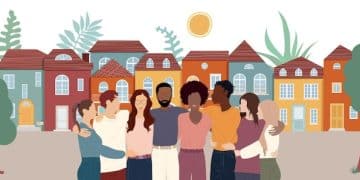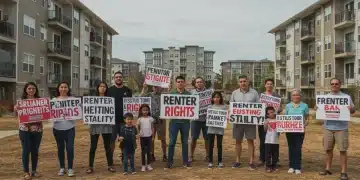The Ultimate Guide to Community Resources and Your Rights

The Ultimate Guide to Understanding Your Rights and Accessing Community Resources provides a comprehensive overview of legal rights and available community support systems, empowering individuals to navigate challenges and improve their quality of life while fostering community engagement.
Navigating the complexities of legal rights and community resources can be daunting. This guide, The Ultimate Guide to Understanding Your Rights and Accessing Community Resources, aims to demystify the process, providing you with the knowledge and tools to advocate for yourself and your community.
Understanding Your Basic Legal Rights
Knowing your fundamental rights is crucial for protecting yourself and ensuring fair treatment. This section outlines key legal rights everyone should be aware of, providing a foundation for navigating various situations effectively.
Civil Rights
Civil rights protect individuals from discrimination and ensure equal treatment under the law. These rights are enshrined in federal and state laws, safeguarding against discrimination based on race, gender, religion, national origin, age, disability, and other protected characteristics.
Consumer Rights
Consumer rights protect individuals from unfair or deceptive business practices. These rights ensure you receive accurate information about products and services, fair prices, and recourse if you’re harmed by a defective product or service.
- Right to Safety: Products must be safe for their intended use.
- Right to be Informed: Businesses must provide accurate and truthful information.
- Right to Choose: Consumers should have a variety of choices at competitive prices.
- Right to be Heard: Consumers have the right to express concerns and seek redress.
Understanding your basic legal rights empowers you to navigate various situations confidently and advocate for yourself effectively. Knowledge of civil and consumer rights forms a solid foundation for protecting your interests and ensuring fair treatment in all aspects of life.
Accessing Government Assistance Programs
Government assistance programs provide crucial support to individuals and families facing financial hardship, unemployment, or other challenges. Understanding these programs and how to access them can significantly improve your quality of life.
Supplemental Nutrition Assistance Program (SNAP)
SNAP provides food assistance to low-income individuals and families, helping them purchase nutritious food. Eligibility criteria vary by state but generally consider income, household size, and assets.
Temporary Assistance for Needy Families (TANF)
TANF provides temporary financial assistance to families with children, helping them meet basic needs. The program also emphasizes work preparation and job training to promote self-sufficiency.
Navigating government assistance programs can be complex, but understanding the available resources and eligibility requirements is the first step toward accessing the support you need. Many programs offer online applications and resources to simplify the process.
Finding Local Community Support Organizations
Community support organizations play a vital role in providing resources and services to address various needs within the community. These organizations offer a wide range of assistance, from food banks and shelters to counseling services and legal aid.

Food Banks and Pantries
Food banks and pantries provide food assistance to individuals and families experiencing food insecurity. These organizations collect and distribute food donations to those in need, ensuring access to nutritious meals.
Homeless Shelters and Housing Assistance
Homeless shelters offer temporary housing and support services to individuals experiencing homelessness. Housing assistance programs provide rental assistance, transitional housing, and other resources to help people secure stable housing.
- Identifying Local Organizations: Use online directories and community resource guides.
- Contacting Organizations: Call or visit the organization’s website to learn about services and eligibility.
- Attending Community Events: Network with local organizations and learn about available resources.
Local community support organizations are essential for addressing diverse needs within the community. By connecting with these organizations, you can access vital resources and services that improve your well-being and contribute to a stronger community.
Navigating the Healthcare System
The healthcare system can be complex and challenging to navigate, especially for those unfamiliar with insurance, medical terminology, and available resources. Understanding your healthcare rights and options is crucial for accessing quality care.
Understanding Health Insurance
Health insurance helps cover medical expenses, making healthcare more affordable. Different types of health insurance plans exist, including private insurance, Medicaid, and Medicare, each with its own coverage and eligibility requirements.
Accessing Affordable Healthcare
Several programs and resources help individuals access affordable healthcare, including community health centers, sliding fee scales, and prescription assistance programs. These options ensure healthcare is accessible to everyone, regardless of income.
Navigating the healthcare system requires understanding your insurance options, available resources, and patient rights. By taking the time to learn about these aspects, you can ensure you receive the quality care you deserve.
Protecting Yourself from Discrimination
Discrimination is the unjust or prejudicial treatment of individuals based on certain characteristics, such as race, gender, religion, or disability. Understanding your rights and protections against discrimination is essential for creating a fair and equitable society.
Identifying Discrimination
Discrimination can manifest in various forms, including employment discrimination, housing discrimination, and public accommodation discrimination. Recognizing these forms of discrimination is the first step toward addressing and preventing them.
Reporting Discrimination
If you experience discrimination, several agencies and organizations can help. The Equal Employment Opportunity Commission (EEOC) investigates employment discrimination claims, while the Department of Housing and Urban Development (HUD) addresses housing discrimination.
- Documenting Incidents: Keep detailed records of discriminatory incidents, including dates, times, and witnesses.
- Filing a Complaint: Contact the appropriate agency to file a formal complaint.
- Seeking Legal Assistance: Consult with an attorney to explore your legal options.
Protecting yourself from discrimination requires understanding your rights, recognizing discriminatory practices, and taking action when discrimination occurs. By reporting discrimination and advocating for equality, you contribute to a more just and inclusive society.
Advocating for Change in Your Community
Advocating for change in your community involves actively participating in efforts to address social issues and improve the lives of others. This can take many forms, from volunteering and community organizing to contacting elected officials and supporting local initiatives.
Getting Involved in Local Politics
Local politics play a crucial role in shaping community policies and priorities. By attending town meetings, contacting elected officials, and running for office, you can influence decisions that impact your community.
Supporting Community Initiatives
Community initiatives address various needs, from environmental sustainability and affordable housing to education and public health. By volunteering, donating, and raising awareness, you can support these initiatives and contribute to positive change.
Advocating for change in your community empowers you to address social issues and create a better future for yourself and others. By getting involved in local politics, supporting community initiatives, and raising awareness, you can make a meaningful difference.
| Key Point | Brief Description |
|---|---|
| ⚖️ Legal Rights | Knowing your rights protects you from discrimination and unfair treatment. |
| 🏡 Housing Assistance | Programs provide rental aid and shelter for those in need. |
| 🛡️ Protecting from Discrimination | Learn how to identify and report discrimination. |
| 🤝 Community Involvement | Participating in local politics and initiatives creates positive change. |
Frequently Asked Questions
▼
Tenants have the right to a safe and habitable living environment, protection from discrimination, and proper notice before eviction. Landlords must also adhere to lease agreements and state laws regarding rent increases and property maintenance.
▼
Explore community health centers, which offer healthcare services on a sliding fee scale based on income. Medicaid and Medicare are government programs that provide coverage to eligible individuals. Prescription assistance programs can also help lower medication costs.
▼
Document every incident, including dates, times, and details. File a complaint with the appropriate agency, such as the EEOC or HUD. Seek legal advice from an attorney experienced in discrimination cases to understand your options.
▼
Consult legal aid organizations, government agencies, and non-profit groups that offer educational resources and legal advice. Law libraries and online legal databases can also provide valuable information about your rights and legal obligations.
▼
Volunteer at local organizations, attend community meetings, and support local initiatives. Contact your elected officials to voice your concerns and advocate for change. Join neighborhood associations and participate in community events to connect with others.
Conclusion
Understanding your rights and accessing community resources is essential for empowering yourself and improving your quality of life. By taking the time to learn about your rights, exploring available resources, and advocating for change, you can create a positive impact in your community.





